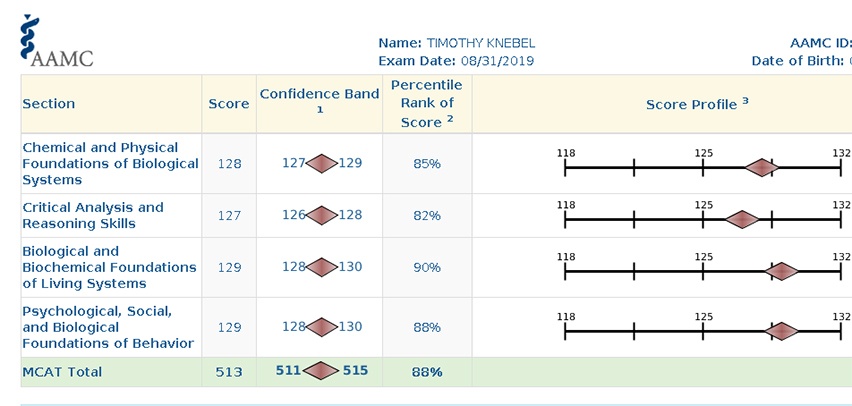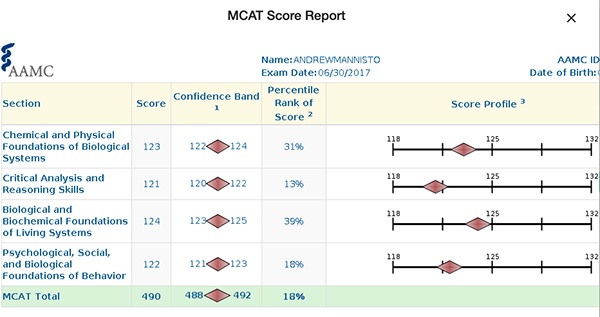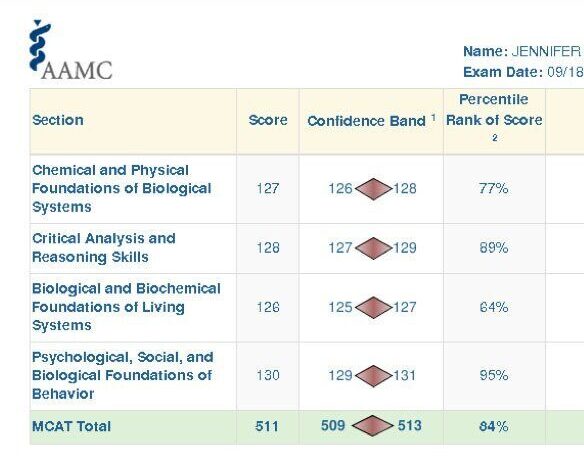Today we want to introduce you to a future doctor with a really inspiring MCAT success story! His name is Tim Knebel and he's one of the MCAT Mentors on our team 🙂 Enjoy!
Hi I'm Tim and in this article, I want to give you some of my top strategies on how I scored a 513 on the MCAT, even when I was barely scoring a 500 just weeks before my MCAT test date.
I hope reading about my insights, my mistakes, and my successes, can inspire you and help you in increasing your own score to a competitive level, no matter how bad you might think your situation currently is.
I know many premeds are nontraditional students, so hopefully my story can help remind some of them that having a different path to medicine is actually an asset.
It started after graduating high school, when I went to community college but soon dropped out because I had absolutely no academic motivation and was dealing with a lot of personal issues.
For the next three years I worked, played in a band, and slowly got my life together which eventually culminated in me finding an intense passion for mental health and caring for people.
I also became interested in science for the first time in my life, but the thought of actually being able to study science never crossed my mind.
Strangely, the thought did cross my mind one day and after several months of thinking about what the path actually meant and whether I could do it or not, I decided that I needed to embark on the path to becoming a physician.
After three years and with no study skills from previous schooling, I went back to community college and started completely from scratch. By scratch, I mean in the three semesters I went to community college (the first time, before dropping out) I got one B and everything else was an F or W.
I spent 3 1/2 years there and then transferred to UC San Diego for Biochemistry.
If I Can Do It, You Can Do It
The reason I'm sharing all of this is for that stereotypical "if I can do it, you can do it" factor.
I managed to claw my way from being a very dysfunctional person with a nearly incalculably low GPA and no study skills to going to a top university and getting a 513 on the MCAT.
More...
As far as what I actually did to work my way up to a higher MCAT score, I started out being very inefficient with studying and slowly learned how I learned best so that I could study more efficiently.
I learned a lot about studying through the MCAT process, but the two biggest pieces of advice I can give are 1) understand the value of MCAT practice exams and 2) understand the value of mindset on the MCAT.
1 - Understand The Value of MCAT Practice Exams
Understand that most of your learning will likely come from practice exams, not burying your head in review books and flashcards.
The "secrets" of the MCAT are not hidden in the depths of your general chemistry textbook or your list of physics equations. Furthermore, doing well on the MCAT is NOT about memorizing every page of every review book you can find.
Forgive the odd analogy, but consider this question: if you go down to Home Depot and buy everything they have, does that make you capable of building a house?
Of course not because building a house isn't simply about having the materials/tools, it's about having an understanding of how the materials need to be used.
In fact, you will get much further with 1/4 of the materials and a really solid understanding of how the materials fit together than you would with all the materials and very little understanding.
Review books, flashcards, and focused/directed studying are essential (much like the materials needed to build a house), but you must pair that with a solid understanding of and an efficient approach to the exam.
MedLife Mastery focuses on this exact fundamental principle; figuring out proven methods to use the material (that every MCAT test taker owns) and proven methods to approach this exam, then making them available in the form of step-by-step guides, so you have the complete formula for a high MCAT score.
Every premed is using the same resource as everyone else, yet only a certain few (the eventual top scorers) will invest time and energy into learning the right way to leverage them to approach an exam that is beyond what they've ever experienced.
For example, one approach that really helped me was reading questions/passages as if I were one of the test writers "reviewing" questions for a future exam. This really helped me develop an ability to efficiently and quickly take passages/questions apart.
2 - Understand The Value of Mindset on the MCAT
Inoculate yourself as best as you can against your fears about the exam. Mentally, the exam will be as bad as you make it.
If you approach the exam from a place of fear, then you're giving the exam a power that is extremely difficult to combat.
Fear will not help you on the MCAT and the more you operate from a place of fear, the more you will be concerned with not getting questions wrong (as opposed to getting them right) and the harder it will be to manage yourself.
Managing yourself is one of the most important aspects of the exam because that's part of the test! They want to see how you manage getting flustered, confused, and bombarded with a lot of information.
That kind of means that you're SUPPOSED to get flustered, confused, bombarded, and overwhelmed. Therefore, these feelings aren't necessarily a sign that something is going wrong or that you don't know enough.
Feeling flustered, confused, bombarded, and overwhelmed are as much a part of the exam as Biochemistry or Psychology.
You wouldn't approach the exam with the hope that they don't ask anything about Biochemistry or Psychology because you know those are topics that the test covers, so don't approach the exam with the hope that you won't have those feelings because you know they are part of the test.
Include the feelings of being flustered, confused, bombarded, and overwhelmed in the list of topics you know the exam covers and do away with your fear of having those feelings.
One thing that helped me inoculate myself against my fears was realizing this:
One of the results of studying hard and taking practice tests is that you earn the right to trust yourself and your hard work.
Get out of your own way and breathe.
Two Key Strategies I Used To Impove My MCAT Score
Another thing that really helps me learn is to talk about the things I'm studying. This works for the MCAT as well.
If you have a friend who is also studying for the MCAT, or if you have a friend who is taking a class on topics you're studying, have conversations about those topics. If you don't, get a white board give a lecture to your pillow or stuffed animal on the topics you studied that day. I know it might seem silly, but it will make your understanding (or lack thereof) very apparent.
Another skill I learned is how to learn from tests and this definitely applies to the MCAT. After a practice test, don't just look at your score, look at WHY you got questions wrong and categorize these reasons in an Excel or Sheets document.
My categories were content, careless reading/calculations, tricky question/passage, and duh. These categories then allowed me to more efficiently improve my test-taking because I could see where I was making more mistakes.
In addition to this, you should also look at the answers you got right and examine WHY you got them right. This is just as helpful as looking at wrong answers.
The MCAT Study Materials I Used
As for study materials I used the Princeton Review book set, Anki for flashcards (I recommend making them yourself), Princeton Review practice tests, an AAMC practice test, MedLife Mastery Must-Know Content Checklist, MedLife Mastery Top Scorer Strategy Guide, and the strategies sent in the MedLife Mastery emails.
Each of the MedLife Mastery resources were very helpful in a variety of ways and I'd like to focus on them one at a time. The MedLife Mastery Top Scorer MCAT Strategy Guide was very helpful in helping me develop a philosophy about the exam. I benefited greatly from reading the passages about studying alone v.s. in a group, how to construct a study schedule that's efficient and geared towards you, and how to conceptualize the exam in your head such that you understand what exam is about.
The MedLife Mastery Must-Know Content document was very helpful in targeting my content review and differentiating between high-yield and low-yield topics. I was able to use the document to figure out which specific topics to do a deep-dive on.
The MedLife Mastery strategies sent via email were immensely helpful. One of the reasons they were helpful was they had strategies and approaches to the exam and to studying that I never would've figured out in a million years. For example, looking at the questions I got right on a practice exam and learning from them would've never crossed my mind.
These emails were also helpful because they helped me formalize and improve on strategies that I figured out on my own (sometimes without realizing that I was doing it). For example, I started reading passages while trying to get into the mindset of the writer without realizing that I was doing that. When I read the tip about reading questions with the writer in mind, the strategy clicked and I was able to maximize it as a result.
How I Scored 129 in Biochem and Pysch/Soc
My top sections were a 129 in Bio/Biochem and Psych/Soc. These sections are very different from each other so my advice is different for each.
My 129 Bio/Biochem Strategies
I felt like this was the section that usually had the highest amount of fluff and misleading/useless information in the passages, so a huge key to this section is practicing the art of discerning important/useful information from the rest of the passage.
If you're having difficulty finding the important information, then shift your focus to finding the unimportant information. Maybe the passage starts out with a couple sentences describing how bone marrow produces white blood cells, and then the rest of passage is about red blood cells. In all likelihood, that bit about white blood cells has nothing to with anything.
Also, maybe you read the passage well, but now the answers are making you stuck. Maybe you don't immediately know the right answer, but maybe you can identify the wrong answers. Sometimes the only way you can answer the question is by process of elimination.
My 129 Psych/Soc Strategies
I think the Psych/Soc section is the most unique on the exam. The key to this section is not the Psych/Soc content (obviously it's still important), it's actually your understanding of experimental design, statistics, and your stamina. You won't be calculating variances or anything, but there are a lot of questions that (although they involve Psych/Soc content) are actually testing your thinking about data and experiments.
The other thing I would say about this section is that a lot of people are surprised by how low their Psych/Soc scores are. I think this is for two reasons, with the second one being what makes psych/soc the most unique section on the MCAT:
1) They see the content as easier and therefore assume the section will be easier. Don't be fooled. It would be a shame to kill the first three sections and then have your score be tanked by the "easiest" section. Mind your p's and q's.
2) It comes at the end of the exam which means they're tired and want the exam to be over. Imagine yourself as a physician and you're 16.5 hours into an 18-hour overnight shift at the hospital. You're tired, hungry, and you have every reason to want to phone it in for the last 1.5 hours. Can you do that? Of course not.
In my mind, THAT is part of what they're testing you on here, and that's why I consider this the most unique section on the exam. When training yourself for this section, you're actually starting to train yourself for when it's 5:30 AM, you've been working since 1 PM the previous day and you have to stay focused until the second you're off the clock. Show them you can do that. Don't fall into these pits!
How I Would Improve My CARS Score
My lowest section was 127 in CARS. What I would do differently is simply more practice. MCAT CARS was by far the most stagnant section for me. Between practice tests and the real exam, I only ever got a 126 or 127.
I'm a VERY slow reader and it was very difficult for me to increase my speed without a catastrophic drop in comprehension. Honestly, I think I just took the test too soon and by the time I found out about the material MedLife Mastery had on CARS, it was essentially too late.
My advice would be to start studying this section as early as possible. First, don't read any strategies and see how you do naturally. Then, based on your speed, comprehension, and number of answers right, look for strategies (MedLife Mastery CARS Course) that target your weaknesses.
My MCAT Journey Was Not Pretty
At the end of the day, although I managed to do well on the MCAT, I really struggled through the studying process. At times, I was completely lost with how to improve my score, how to move more efficiently through the exam, or even how to study better.
I got so burnt out and frustrated I took several weeks off from studying and only returned to studying a month from my test date!
In a nutshell, my MCAT journey was not pretty. So I understand how you feel when you aren’t getting the scores you want, are unsure of how to study more efficiently, and don’t know what to do next.
Which is why if you ever need the help, we're always here to help you develop a way of thinking about the exam such that your energy, study time, and exam time are maximized.
Remember, if I can do it, so can you.
Much gratitude to Tim for taking the time to write his story!
If you're struggling more than you thought you would with your MCAT, remember that eventually all students, no matter how smart, meet obstacles during MCAT prep that feel frustrating, overwhelming, and insurmountable. So you're not alone and you're on the same journey many top scorers went through...
The top scorers who made it through focused on the approach. Like Tim said - it's not about the materials and resources you have, it's about how you use them to accomplish your end goal.
Our complete focus is on the approach. That's what leads to the largest score increases. This is everything we have on the smartest approach to mastering the MCAT, which includes the same resources Tim used to increase his score.
Lastly if you haven't already, listen to Tim's full podcast interview. It goes into much more detail on how to increase your score like he did.
Remember, you didn't come this far, to only come this far.
You got this,
The MedLife Mastery Team
Your MCAT Success Mentors
Additional Reading -- MCAT Success Stories:
- How Jennifer Increased Her MCAT Score By 10 Points In Less Than 30 Days
- A 17-Point MCAT Score Increase: 496 to 513! (ft. Stephanie Hayes)
- From 490 To 511 On The MCAT: His 21 Point Score Increase
- Siraj’s 3-Month 523 MCAT Study Plan As A Full-Time Student
- From 485-495 Plateau + 4 MCAT Attempts To 514 (1.5 Years Later!)
- 41-Year-Old Accountant and Father Dominates The MCAT With a 520!
- Noah’s MCAT Success Story: From 496 To 510 On The MCAT In Less Than 30 Days!
- 19 Point MCAT Score Increase In 6 Weeks While Working Full Time
- From 500 Plateau to 516 in Less than 30 Days (ft. Abbi Shrontz)
- From 501 Plateau To 513 On The MCAT
- From 499 to 512 on the MCAT in 24 Days
- Melissa's MCAT Scores Kept Going Down, But She Didn’t Give Up
- How Tanmay Scored 514 On The MCAT In Just 3 Months!
- How Peter Went From 499 To 513 On The MCAT In 8 Weeks
- From 494 (2015) to 502 (2019) to 513 on the MCAT (ft. Jennifer Nagel)
- From 498 To 514 WITH A Busy Schedule!
- From 499 To 511 In 4 Weeks On MCAT Retake!
- From 500 To 512 (Exact Goal Score) In 30 Days!
- From 500 To 514 On The MCAT (2.5 Years Later)
- From 501 To 514 In The LAST 2 WEEKS Before The MCAT!
- From 64th Percentile To 98th Percentile On The MCAT In Less Than 30 Days
- How Kayla Scored 131 In Psych/Soc on the MCAT
- How He Increased His MCAT Score From 499 To 512 In 3 Weeks
- From 489 To 509: How She Improved Her MCAT Score By 20 Points
- 6 Point Score Increase In the Last Week Before the MCAT
- How Melanie Increased Her MCAT Score By 12 Points (From 505 to 517)
- Interview with a 519 Scorer, Re-Taker, and MS1: Julia Meguro
- MCAT Master Interview With A 100th Percentile Scorer: Priya Swaminathan
- Best MCAT Bio/Biochem Strategies – Top Tips From A 131 Scorer
- From 499 To 515 On The MCAT In 7 Weeks!
- Hope’s MCAT Retake Story: I Went From 500 to 514 In 6 Weeks!
- How Oleksandra Retook The MCAT and Scored 510
- How Suman Scored Over 510 The Second Time
- From 503/505 To 511 In The FINAL 2 Weeks!
- How Sara Scored 522 On The MCAT
- Taylor's Secret To Scoring 131 On CARS and 511 on the MCAT
- Tara’s MCAT Study Advice Based On Her 510 MCAT Score
- Jenny's Motivational MCAT Success Story: From 499 To 511 In 3 Weeks?!
- A Non-Traditional Applicant’s 514 (91st Percentile)
- How Lindsay Scored 513 On The MCAT While Working Two Jobs
- How Morgan Improved Her MCAT Score From 498 To 511 While Working Full Time
- 10-Point MCAT Score Jump in 2 Weeks: From 503 to 513!
- Can You Have A Social Life During MCAT Prep? (ft. two 515+ scorers!)
Want us to send you new top scorer MCAT success stories when we release them?
Each case study will bring you new tips, new strategies, and revive your motivation to dominate the MCAT!








